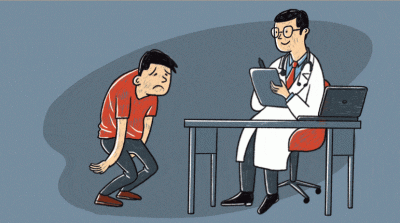Male fertility is a complex and sometimes confusing issue. For instance, did you know that drinking too much alcohol may interfere with sperm production and function, that being overweight may impact libido, and that sexually transmitted diseases may have a lasting effect on future fertility?
We asked Dr Ee Tat Xin, Consultant with the Department of Reproductive Medicine at KK Women’s and Children’s Hospital, and Traditional Chinese Medicine (TCM) Physician Seah Ai Wei, Head of Thomson Chinese Medicine, to address some of the most common questions about male reproductive health.
Q: What might affect male fertility?

Dr Ee: There are several conditions and issues that may affect male fertility. These include advanced age, obesity, sexually transmitted infections, birth defects, autoimmune disorders, enlarged varicose veins, steroid abuse, exposure to toxic or hazardous substances, and prolonged or repeated exposure (of your testicles) to high temperatures.
Q: How can men test if they’re infertile?

Dr Ee: Typically, they’d do a semen analysis (SA) test. Depending on the result, they may be asked to undergo further testing. The parameters of the components of the SA are wide-ranging. For example, the concentration of sperm in a man’s semen may range from zero to hundreds of millions, but that does not mean that a man with a low sperm count will never impregnate his wife, or that a man with a high sperm count can definitely impregnate his wife.
Q: Does male infertility require ongoing treatment, and can it be cured or reversed?
Dr Ee: Treatment depends on the cause. Should the infertility be due to a previous vasectomy (male sterilisation), for instance, or recent hormonal or steroid use, then it can be reversed. In addition, men with poor sperm quality due to chronic diseases like obesity or diabetes will often see their sperm quality improve once they get those diseases under control.
However, causes such as testicular failure, genetic disorders or congenital absence of the vans deferens (the long muscular tube that propels sperm into the urethra during ejaculation) are irreversible. Men with these conditions may be asked to consider in-vitro fertilisation for their best chance of conceiving.
Q: How much is being overweight or obese associated with infertility in men?

Dr Ee: Obesity is known to impact a man’s hormonal health. This may affect the production or quality of his sperm and even his libido and erectile function. Obesity is also associated with depression, which may further adversely affect a man’s sexual health.
Q: Does age affect a man’s fertility?

Dr Ee: A man’s age doesn’t affect the quality of his sperm the way a woman’s age affects the quality of her eggs. However, there’s increasing evidence to show that sperm quality does decline slightly as a man gets older. Men over the age of 40 tend to contribute to reduced fertility and fecundity of a couple, especially when his wife is also of advanced age.
Sperm DNA damage has also been observed to be significantly higher in older men. This damage may be detrimental to reproductive outcomes. In addition, older men tend to show a higher incidence of sexual dysfunction, which may affect their fertility.
Physician Seah: From a TCM perspective, every eight years of a man’s life is a milestone, versus seven years for a woman. So while women generally menopause at the age of 49 (7×7), men can continue to have children up to the age of 64 (8×8). However, the Kidney Energy that governs reproductive health peaks at 32 years and starts to decline after 40, so a man’s fertility does decline as he ages.
Q: How is prostate health related to male fertility?

Dr Ee: The prostate plays a pivotal role in male fertility as it is directly involved in the secretion of prostatic fluid into the semen and is also crucial for the synchronised cascade of events that lead to ejaculation. You can keep your prostate healthy by constantly monitoring for symptoms such as persistent urine hesitancy, pain when urinating and haematuria (blood in the urine).
It’s also important to prevent sexually transmitted diseases, which may have a lasting effect on future fertility. You can do this by practising safe sex.
Q: How might infertility affect a man emotionally, and how can his spouse show her support?

Dr Ee: Having poor sperm quality or erectile dysfunction can be emotionally taxing on men and stressful for his wife, which is why it’s important for both partners to support each other through their fertility treatment journey.
Q: What lifestyle changes do you recommend to enhance male fertility?

Dr Ee: Smoking, alcohol consumption and drug abuse can be detrimental to a man’s fertility, so men who smoke cigarettes, drink heavily, and use drugs such as heroin, cocaine and anabolic steroids should modify these behaviours as early as possible.
Substances in cigarette smoke aren’t only toxic to sperm; they may also damage the eggs and the developing embryo during pregnancy. Drugs, too, can affect sperm production. And heavy alcohol consumption can affect hormone levels in men (and women) and interfere with sperm production and function.
Physician Seah: Maintaining a healthy Body Mass Index (BMI) of 18.5-25.9, minimising stress and prevent overheating of testicles (activities such as cooking, cycling and usage of laptops can result in overheating). Use of Chinese herbal medicine and acupuncture can also invigorate the Kidney Energy to improve sperm quality.
Q: What are some common myths about male infertility?

Dr Ee: There are a few:
It’s always the woman’s fault if a couple can’t have a baby: Worldwide, about one-third of infertile couples have significantly abnormal sperm counts, therefore the burden of infertility is shared between both spouses. To find the cause of infertility, a couple should seek medical help together. If the man doesn’t undergo a semen analysis as deemed necessary by the doctor, it would be difficult to determine the cause(s) of infertility.
Infertility can always be treated, especially with medical advancements in assisted reproductive techniques: Even with medical advancements, the cause(s) of infertility in some couples may remain unknown. Plus, all procedures carry some form or level of risk and there’s no guarantee of conception despite undergoing treatment.
You can only conceive with certain sex positions: There’s no scientific evidence for this. The key is really the timing of sexual intercourse, to increase the chance of the egg meeting the sperm. Even after undergoing an embryo transfer, some female patients think they need to lie flat on the couch for the next hour to boost their chances of falling pregnant, but this is not necessary; they can resume normal activities immediately after an embryo transfer.
If you already have a child, there’s no way you can be infertile or not have more children: Some couples may experience secondary infertility due to medical conditions that developed after their previous pregnancy, such as endometriosis, hormonal imbalance or problems with the sperm. Sometimes, the infertility may be age-related as well. Couples who have not conceived after some time despite having unprotected sex should consult a fertility expert for further assessment and medical advice.
Wearing tight jeans or underwear may affect male fertility: Some research has shown that men who wear looser underwear tend to have better sperm parameters than men who wear tighter underwear. It is hypothesised that wearing tight underwear or tight jeans causes heat to be withheld in the genitals, leading to overheating and damage of sperm.
This post was brought to you by I Love Children.






